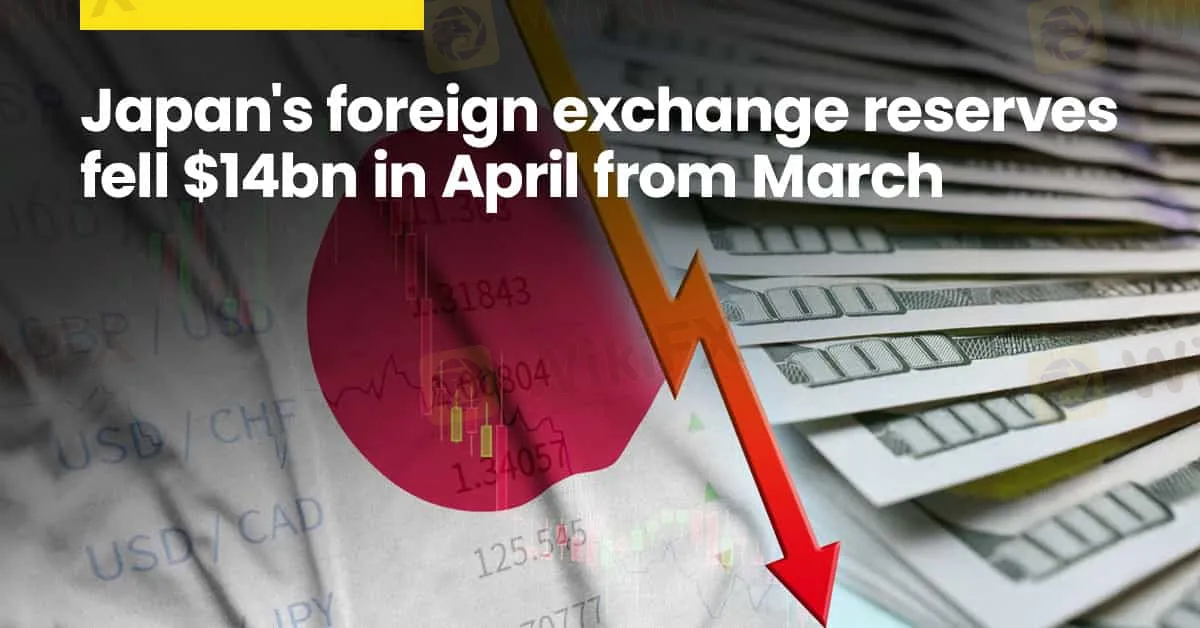简体中文
繁體中文
English
Pусский
日本語
ภาษาไทย
Tiếng Việt
Bahasa Indonesia
Español
हिन्दी
Filippiiniläinen
Français
Deutsch
Português
Türkçe
한국어
العربية
Japan's foreign exchange reserves fell $14bn in April from March
Abstract:In April, Japan experienced a significant decline in its foreign currency reserves, with a drop of $14 billion largely attributed to the decrease in the value of foreign securities holdings.

In April, Japan experienced a significant decline in its foreign currency reserves, with a drop of $14 billion largely attributed to the decrease in the value of foreign securities holdings.
According to a finance ministry report released on Thursday, Japan's forex reserves fell to $1.14 trillion in April. This decline was primarily driven by a decrease in holdings of foreign securities, which decreased from $995 billion to $978 billion compared to the previous month. The decrease in securities holdings was anticipated due to a drop in the market value of overseas assets, including Treasuries, as yields rose.
This data follows speculation that Japan intervened in the market twice to support the yen, with the first intervention occurring at the end of April. While Japanese officials have not confirmed any intervention, a Bloomberg analysis of the central bank's current account suggests that the nation likely entered the market twice last week. The estimated amount of yen bought during the first action is approximately ¥6.2 trillion ($40 billion), based on updated data and money broker estimates.
Japanese officials have consistently maintained a strategy of neither confirming nor denying intervention, leaving investors to infer market moves. Finance Minister Shunichi Suzuki and his deputy declined to confirm any interventions when questioned by reporters last week and earlier this week, respectively.

Disclaimer:
The views in this article only represent the author's personal views, and do not constitute investment advice on this platform. This platform does not guarantee the accuracy, completeness and timeliness of the information in the article, and will not be liable for any loss caused by the use of or reliance on the information in the article.
Read more

The Impact of Interest Rate Decisions on the Forex Market
Interest rate changes determine currency attractiveness, influencing capital flows and exchange rate trends. Understanding this mechanism helps investors navigate the forex market effectively.

How a Housewife Lost RM288,235 in a Facebook Investment Scam
A 47-year-old housewife in Malaysia recently fell victim to an online investment scam, losing a substantial sum of RM288,235 after engaging with a fraudulent scheme advertised on Facebook.

Interactive Brokers Launches Forecast Contracts in Canada for Market Predictions
Interactive Brokers introduces Forecast Contracts in Canada, enabling investors to trade on economic, political, and climate outcomes. Manage risk with ease.

Bank Negara Malaysia Flags 12 New Companies for Unauthorised Activity
Bank Negara Malaysia (BNM) has updated its Financial Consumer Alert List (FCA List) by adding 12 more entities, reinforcing its efforts to warn the public against unregulated financial schemes. Check if your broker made the list!
WikiFX Broker
Latest News
TradingView Brings Live Market Charts to Telegram Users with New Mini App
Trump tariffs: How will India navigate a world on the brink of a trade war?
Interactive Brokers Launches Forecast Contracts in Canada for Market Predictions
Authorities Alert: MAS Impersonation Scam Hits Singapore
Stocks fall again as Trump tariff jitters continue
INFINOX Partners with Acelerador Racing for Porsche Cup Brazil 2025
Regulatory Failures Lead to $150,000 Fine for Thurston Springer
April Forex Trends: EUR/USD, GBP/USD, USD/JPY, AUD/USD, USD/CAD Insights
March Oil Production Declines: How Is the Market Reacting?
Georgia Man Charged in Danbury Kidnapping and Crypto Extortion Plot
Currency Calculator







